第六单元 词类转换翻译法 作业
- 格式:doc
- 大小:39.50 KB
- 文档页数:4


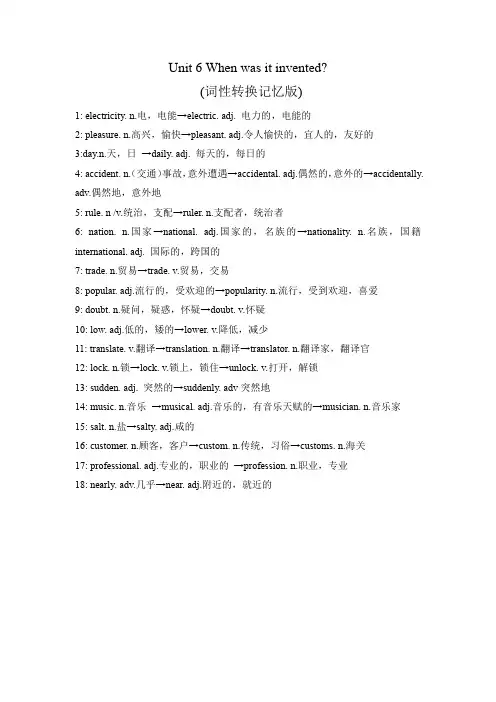
(词性转换记忆版)1: electricity. n.电,电能→electric. adj. 电力的,电能的2: pleasure. n.高兴,愉快→pleasant. adj.令人愉快的,宜人的,友好的3:day.n.天,日→daily. adj. 每天的,每日的4: accident. n.(交通)事故,意外遭遇→accidental. adj.偶然的,意外的→accidentally. adv.偶然地,意外地5: rule. n /v.统治,支配→ruler. n.支配者,统治者6: nation. n.国家→national. adj.国家的,名族的→nationality. n.名族,国籍international. adj. 国际的,跨国的7: trade. n.贸易→trade. v.贸易,交易8: popular. adj.流行的,受欢迎的→popularity. n.流行,受到欢迎,喜爱9: doubt. n.疑问,疑惑,怀疑→doubt. v.怀疑10: low. adj.低的,矮的→lower. v.降低,减少11: translate. v.翻译→translation. n.翻译→translator. n.翻译家,翻译官12: lock. n.锁→lock. v.锁上,锁住→unlock. v.打开,解锁13: sudden. adj. 突然的→suddenly. adv突然地14: music. n.音乐→musical. adj.音乐的,有音乐天赋的→musician. n.音乐家15: salt. n.盐→salty. adj.咸的16: customer. n.顾客,客户→custom. n.传统,习俗→customs. n.海关17: professional. adj.专业的,职业的→profession. n.职业,专业18: nearly. adv.几乎→near. adj.附近的,就近的(词性转换默写版)1: electricity. n.电,电能→ . adj. 电力的,电能的2: pleasure. n.高兴,愉快→ . adj.令人愉快的,宜人的,友好的3:day.n.天,日→ . adj. 每天的,每日的4: accident. n.(交通)事故,意外遭遇→ . adj.偶然的,意外的→ . adv.偶然地,意外地5: rule. n /v.统治,支配→ . n.支配者,统治者6: nation. n.国家→ . adj.国家的,名族的→ . n.名族,国籍→ . adj. 国际的,跨国的7: trade. n.贸易→ . v.贸易,交易8: popular. adj.流行的,受欢迎的→ . n.流行,受到欢迎,喜爱9: doubt. n.疑问,疑惑,怀疑→ . v.怀疑10: low. adj.低的,矮的→ . v.降低,减少11: translate. v.翻译→ . n.翻译→ . n.翻译家,翻译官12: lock. n.锁→ . v.锁上,锁住→ . v.打开,解锁13: sudden. adj. 突然的→ . adv突然地14: music. n.音乐→ . adj.音乐的,有音乐天赋的→ . n.音乐家15: salt. n.盐→ . adj.咸的16: customer. n.顾客,客户→ . n.传统,习俗→ . n.海关17: professional. adj.专业的,职业的→ . n.职业,专业18: nearly. adv.几乎→ . adj.附近的,就近的。


人教版八年级下册英语Unit 6词性词性转换及默写Unit 6 词性转换1.wife - (复数) wives2.shoot - shot - shot v。
射击,射门3.west n。
西;西方 - western adj。
西方的;西部的4.move v。
移动;搬动 - moved adj。
受感动的(人) - moving adj。
感人的(物)5.hide - hid - hidden v。
隐藏,隐瞒6.n n。
传统 - ___。
传统的7.magic n。
魔法;法术;adj。
有魔力的;magical adj。
有魔力的奇妙的 - magician n。
魔术师8.prince n。
王子 - princess n。
公主,王妃9.wonder n。
奇迹;奇观 - wonderful adj。
极好的;精彩的;绝妙的10.touch v。
触摸;接触 - touching adj。
感人的;动人的 - touched adj。
受感动的11.lose v。
失去;丢失 - (过去分词) lost adj。
失去的;丢失的,迷路的12.interest v。
使…感兴趣;n。
兴趣 - interesting adj。
有趣的 - interested adj。
感兴趣的(常见搭配:be/e interested in)13.mouse - mice n。
老鼠14.remind v。
提醒;使。
想起 - reminder n。
通知单,提示信15.bright adj。
光线充足的;明亮的 - ___ 明亮地,爽朗地16.lead - led(过去式、过去分词) - leader n。
领导者;领袖 - leading adj。
一流的;领先的,最前的17.gold n。
金子;adj。
金的,金制的(侧重材料)- golden adj。
金色的(侧重颜色)18.marry v。
结婚 - marriage n。
结婚;婚姻 - married adj。
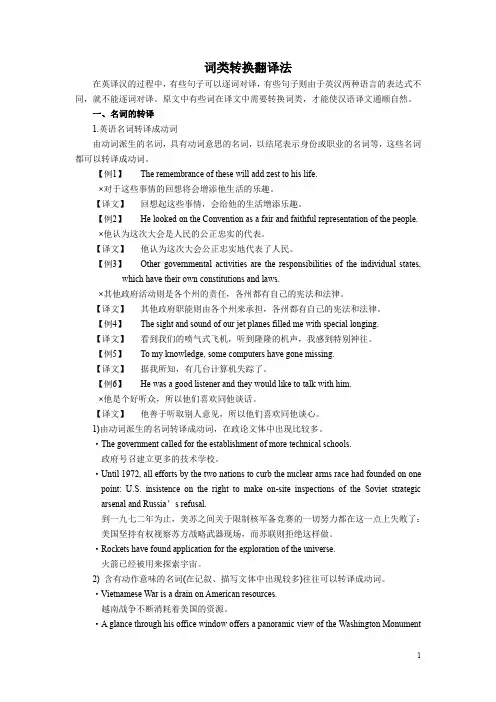
词类转换翻译法在英译汉的过程中,有些句子可以逐词对译,有些句子则由于英汉两种语言的表达式不同,就不能逐词对译。
原文中有些词在译文中需要转换词类,才能使汉语译文通顺自然。
一、名词的转译1.英语名词转译成动词由动词派生的名词,具有动词意思的名词,以结尾表示身份或职业的名词等,这些名词都可以转译成动词。
【例1】The remembrance of these will add zest to his life.×对于这些事情的回想将会增添他生活的乐趣。
【译文】回想起这些事情,会给他的生活增添乐趣。
【例2】He looked on the Convention as a fair and faithful representation of the people.×他认为这次大会是人民的公正忠实的代表。
【译文】他认为这次大会公正忠实地代表了人民。
【例3】Other governmental activities are the responsibilities of the individual states, which have their own constitutions and laws.×其他政府活动则是各个州的责任,各州都有自己的宪法和法律。
【译文】其他政府职能则由各个州来承担,各州都有自己的宪法和法律。
【例4】The sight and sound of our jet planes filled me with special longing.【译文】看到我们的喷气式飞机,听到隆隆的机声,我感到特别神往。
【例5】To my knowledge, some computers have gone missing.【译文】据我所知,有几台计算机失踪了。
【例6】He was a good listener and they would like to talk with him.×他是个好听众,所以他们喜欢同他谈话。
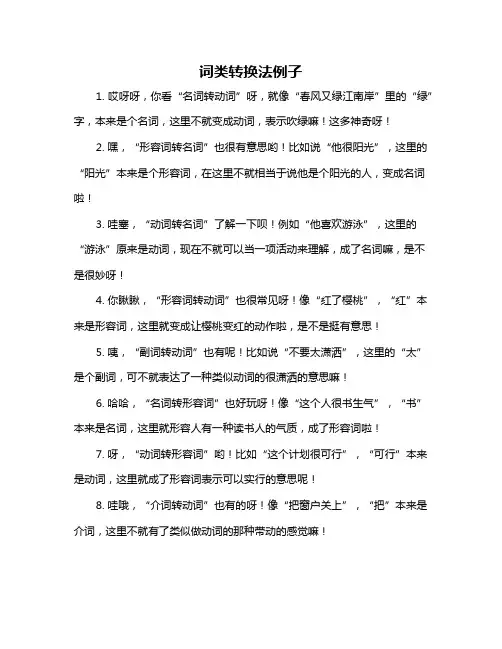
词类转换法例子
1. 哎呀呀,你看“名词转动词”呀,就像“春风又绿江南岸”里的“绿”字,本来是个名词,这里不就变成动词,表示吹绿嘛!这多神奇呀!
2. 嘿,“形容词转名词”也很有意思哟!比如说“他很阳光”,这里的“阳光”本来是个形容词,在这里不就相当于说他是个阳光的人,变成名词啦!
3. 哇塞,“动词转名词”了解一下呗!例如“他喜欢游泳”,这里的“游泳”原来是动词,现在不就可以当一项活动来理解,成了名词嘛,是不是很妙呀!
4. 你瞅瞅,“形容词转动词”也很常见呀!像“红了樱桃”,“红”本来是形容词,这里就变成让樱桃变红的动作啦,是不是挺有意思!
5. 咦,“副词转动词”也有呢!比如说“不要太潇洒”,这里的“太”是个副词,可不就表达了一种类似动词的很潇洒的意思嘛!
6. 哈哈,“名词转形容词”也好玩呀!像“这个人很书生气”,“书”本来是名词,这里就形容人有一种读书人的气质,成了形容词啦!
7. 呀,“动词转形容词”哟!比如“这个计划很可行”,“可行”本来是动词,这里就成了形容词表示可以实行的意思呢!
8. 哇哦,“介词转动词”也有的呀!像“把窗户关上”,“把”本来是介词,这里不就有了类似做动词的那种带动的感觉嘛!
9. 嘿嘿,“代词转名词”呀!例如“大家都来了”,“大家”本来是代词,这里就表示所有人,就是个名词啦!总之,词类转换法真的是太神奇啦,能让我们的语言变得丰富多彩呢!。
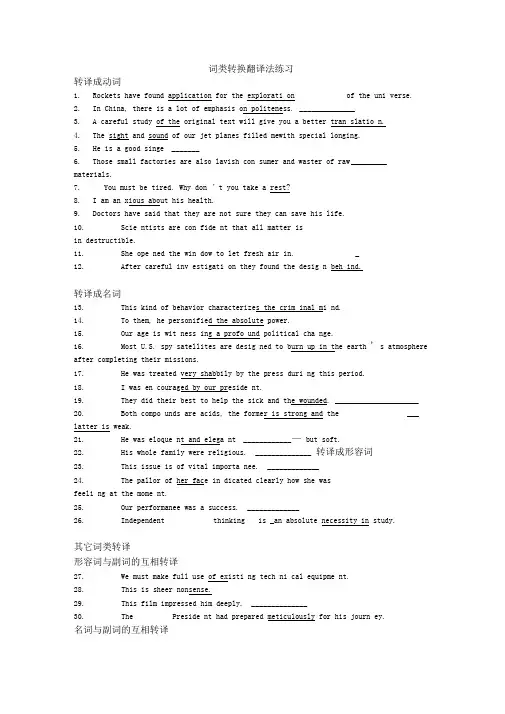
词类转换翻译法练习转译成动词1.Rockets have found application for the explorati on of the uni verse.2.In China, there is a lot of emphasis on politeness. ______________3. A careful study of the original text will give you a better tran slatio n.4.The sight and sound of our jet planes filled mewith special longing.5.He is a good singe _______6.Those small factories are also lavish con sumer and waster of raw _________ materials.7.You must be tired. Why don ' t you take a rest?8.I am an xious about his health.9.Doctors have said that they are not sure they can save his life.10.Scie ntists are con fide nt that all matter isin destructible.11.She ope ned the win dow to let fresh air in. _12.After careful inv estigati on they found the desig n beh ind.转译成名词13.This kind of behavior characterizes the crim inal mi nd.14.To them, he personified the absolute power.15.Our age is wit ness ing a profo und political cha nge.16.Most U.S. spy satellites are desig ned to burn up in the earth ' s atmosphere after completing their missions.17.He was treated very shabbily by the press duri ng this period.18.I was en couraged by our preside nt.19.They did their best to help the sick and the wounded. _____________________20.Both compo unds are acids, the former is strong and the ___ latter is weak.21.He was eloque nt and elega nt ____________ —but soft.22.His whole family were religious. ______________ 转译成形容词23.This issue is of vital importa nee. _____________24.The pallor of her face in dicated clearly how she wasfeeli ng at the mome nt.25.Our performanee was a success. _____________26.Independent thinking is _an absolute necessity in study.其它词类转译形容词与副词的互相转译27.We must make full use of existi ng tech ni cal equipme nt.28.This is sheer nonsense.29.This film impressed him deeply. ______________30.The Preside nt had prepared meticulously for his journ ey.名词与副词的互相转译31.Whe n he catches a glimpse of a pote ntial an tag oni st, his in sti net is to win him over with charm and humor.32.The new mayor earned some appreciatio n by the courtesy ____________________ of coming to visit the city poor.33.It is officially announced that Chi na has successfullylaun ched her fist manned spaceship.34.He is physically weak but me ntally sound. _________参考答案:一、转译成动词1•火箭已经用来探索宇宙。
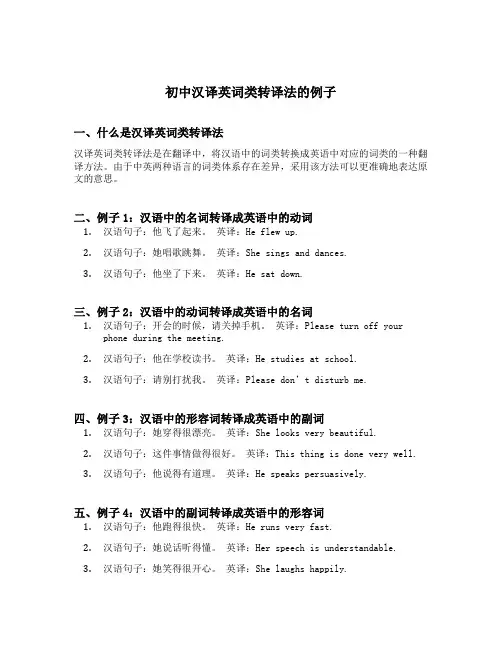
初中汉译英词类转译法的例子一、什么是汉译英词类转译法汉译英词类转译法是在翻译中,将汉语中的词类转换成英语中对应的词类的一种翻译方法。
由于中英两种语言的词类体系存在差异,采用该方法可以更准确地表达原文的意思。
二、例子1:汉语中的名词转译成英语中的动词1.汉语句子:他飞了起来。
英译:He flew up.2.汉语句子:她唱歌跳舞。
英译:She sings and dances.3.汉语句子:他坐了下来。
英译:He sat down.三、例子2:汉语中的动词转译成英语中的名词1.汉语句子:开会的时候,请关掉手机。
英译:Please turn off yourphone during the meeting.2.汉语句子:他在学校读书。
英译:He studies at school.3.汉语句子:请别打扰我。
英译:Please don’t disturb me.四、例子3:汉语中的形容词转译成英语中的副词1.汉语句子:她穿得很漂亮。
英译:She looks very beautiful.2.汉语句子:这件事情做得很好。
英译:This thing is done very well.3.汉语句子:他说得有道理。
英译:He speaks persuasively.五、例子4:汉语中的副词转译成英语中的形容词1.汉语句子:他跑得很快。
英译:He runs very fast.2.汉语句子:她说话听得懂。
英译:Her speech is understandable.3.汉语句子:她笑得很开心。
英译:She laughs happily.六、例子5:汉语中的数词转译成英语中的名词或形容词1.汉语句子:他过了六十岁生日。
英译:He had his 60th birthday.2.汉语句子:我买了十本书。
英译:I bought ten books.3.汉语句子:那个村庄有一千多人。
英译:There are over a thousandpeople in that village.七、例子6:汉语中的量词转译成英语中的of短语1.汉语句子:一杯咖啡英译:a cup of coffee2.汉语句子:一把椅子英译:a chair3.汉语句子:一条狗英译:a dog八、总结汉译英词类转译法是一种有效的翻译方法,特别适用于将中文翻译成英文时,准确表达原文意思。
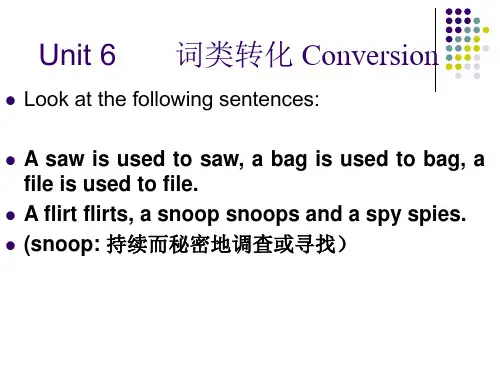
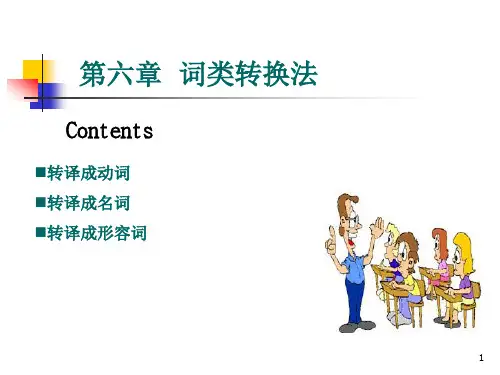
第六单元词类转换翻译法作业
1. I had the impression that your brother was the director of the company.
2. He was a regular visitor.
3. A successful scientist must be a good observer.
4. Telecommunication means so much in modern life that without it our life would be impossible.
5. He is full in vigor, but fails in carefulness.
6. Party officials worked hours on meager food, in cold caves, by dim lamps.
7. When the switch is off . the circuit is open and electricity doesn’t go through .
参考答案
1. 在我的印象中, 你哥哥是那家公司的董事长。
2. 他以前经常来。
3. 一个成功的科学家一定善于观察。
4. 电信在现代生活中的意义十分重大, 没有它就不可能有我们现在的生活。
5. 他劲头十足, 但不够仔细。
6. 党的干部吃简陋的饮食, 住寒冷的窑洞, 靠微弱的灯光, 长时间地工作。
7. 当开关断开时, 电路就形成开路, 电流不能通过。
课后练习
1. The mastery of language is not easy and requires painstaking effort.
语言这个东西不是随便可以学好的,非下苦功不可。
(名词转为动词)
2. In those years the Republicans were in.
那些年是共和党执政。
(形容词转为动词)
3. Every morning she would go to the lake area for a walk.
每天早上,她都要到湖区去散步。
(名词转为动词)
4. The music is a gas.
这音乐妙极了.〔名词转为形容词)
5. The delegates at the conference unanimously expressed their determination to oppose hegemonism on the part of the two superpowers.
会上,代表们一致表示坚决地反对两个超级大国的霸权主义。
(名词转为副词) 6. My suggestion is that he should quit somking at once.
我建议他立刻戒烟.(由于原文中的主语转译成了谓语,原文主语前的定语也相应地转译成主语.)
7. A week after his prelude to the President's visit, China was in。
在他为总统出访所作的序幕之行后一周,中国成了最时新的话题。
(形容词转为名词〕
8. Official Moscow is going to object the proposal.
莫斯科官方准备反对此项提议.(形容词转为名词)
9.Saud was a frustrated man at that time.
沙特那时已受挫折(形容词转为动词)
10. We have known a simila r past of humiliation and exploitation.
在过去。
我们都同样遭受到凌辱和剥削。
(形容词转为副词)
11. Our age is witnessing a profound political change.
我们的时代是深刻的政治变化的见证。
(动词转为名词)
12. Xu Beihong’s drawings (paintings) of horses are exceptionally good
徐悲鸿画马画得特别好。
(名词转为动词)
13. I am so grateful to my father for his continuous encouragement during my childhood.
我非常感谢父亲,因为在我小时侯他总是不断地鼓励我。
14. Millions of the people in the mountainous areas are finally off poverty.
千百万山区人终于摆脱了贫穷(介词转为动词)
15. He came to my home for help
他来到我家,请求帮忙(介词转为动词)
16. At noon, she came home for lunch.
中午,她回家吃午饭。
(介词转为动词)
17. The people are with him.
人民拥护他. (系动词be+介词转为行为动词)
18. The woman, with her two daughters, arrived.
这妇女带着她的两个女儿到了。
(系动词be+介词转为行为动词)
19. He was away before dawn.
他在黎明前出发的〔系动词be+副词转为行为动词〕
20. Traditionally, there had always been good relations between them.
它们之间一直有着传统的友好关系。
(副词转为形容词)
21. We are enemies of all wars, but above all of dynastic wars.
我们反对一切战争,特别是反对王朝战争。
〔系表结构+of 转为动词)22.Differences between the social systems of states shall not be an obstacle to their approach and cooperation.
各国社会制度不同,但不应妨碍彼此接近与相互合作.(to be+名十介~动)23.His real mission in life was to contribute, in one way or another, to the overthrow of capitalist society.
他一生的真正使命是想办法为推翻资本主义社会而作出贡献。
(名十of一动)24.No wonder the sight of it should send the memories of quite a number of people of the old generation back 36 years ago.
难怪老一辈的许多人见了这个就会想到36年前的往事(名十of短语~动宾结构)25.There is a big increase in demand for all kinds of consumer goods in every part of our country.
目前我国各地对各种消费品的需要量已大大增加(形+名~副+动)。